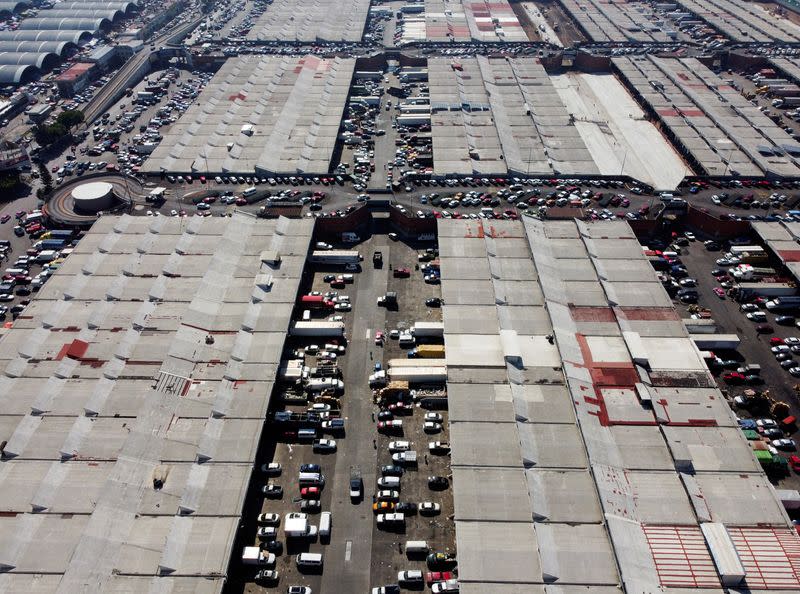Massive food market in Mexico City poised to harness sunshine for power
By Valentine Hilaire
MEXICO CITY (Reuters) - A sprawling fruit and vegetable market in Mexico's capital wants to spark a greener future as the world's biggest urban solar farm, with thousands of photovoltaic panels set to be installed this year on the seemingly endless roofs of its buildings.
The 400 million peso ($19.9 million) roof-top solar project will cover a chaotic wholesale market that serves half a million customers daily, extending over a land equivalent to about 400 football fields.
Once online later this year, the Central de Abasto market's roofs will power some 18 megawatts of generating capacity, according to Fadlala Akabani, the capital's economic development minister, or enough to supply around 14,000 homes.
The project marks a rare green initiative during the government of President Andres Manuel Lopez Obrador, who has mostly sought to prioritize fossil fuel production and power generation via two state-run energy giants - national oil company Pemex and electricity utility CFE.
The CFE is, however, designing the market solar installation and will later operate it.
During his first three years in office, Lopez Obrador has quarreled with private firms that have invested heavily in renewable power in Mexico, even pushing a reform that would cancel many existing private power projects.
"The development of large-scale (solar) projects has been on hold for over a year," said Javier Romero of solar energy association ANES, pointing to heightened political risk and legal limbo seen undermining would-be private generators.
"Who is going to invest without guarantees?"
Solar only contributed about 5% of Mexican power generation last year, according to industry data.
But Mexican solar generation in percentage terms is greater than in the United States, where it contributed almost 3% last year, data from the U.S. Energy Information Administration (EIA) showed.
While the EIA forecasts that U.S. solar will grow to a fifth of the country's electricity by 2050, Mexico's state-run CFE declined to provide its own estimate.
"It's not about percentages, but instead to plan out our energy transition," CFE spokesman Luis Bravo told Reuters.
'WOEFULLY INADEQUATE'
Mexico's past governments have pledged to reach 35% clean energy by 2024, up from 29% currently anchored largely by the CFE's hydroelectric plants and private wind farms. But hitting that target is seen by sector experts as all but impossible given current trends.
Mexico City's wholesale market constitutes one bright spot.
The market is home to around 10,000 booths that mostly sell fruits, vegetables and meat, one of them operated by Arturo Mesa, whose stall was covered by mountains of apples and lettuce on a recent visit.
Mesa hopes new solar panels can cut his power bill.
"I pay 5,000 pesos ($249) every month. That's too much," he said.
Around 36,000 panels are set to blanket building roofs and ultimately generate much more power than the market consumes, with the excess electricity likely made available to other users, said Jose Alberto Valdes, a top energy official with the city's government.
Valdes added that officials aim to equip additional market rooftops with solar panels, but provided no further details.
CFE's Bravo said Lopez Obrador also wants to boost solar power, and pointed to the company's industrial-scale $1.6 billion photovoltaic project planned for northern Mexico's Sonora state.
The facility is expected to cover 2,000 hectares of sunbaked desert, and feature a 1,000-megawwat annual generating capacity.
But it's not expected to come online until 2028.
The solar association's Romero argues that the electricity generation projects in Sonora and Mexico City are woefully inadequate given Mexico's potential.
"It's peanuts," he said. "These are not figures to brag about."
($1 = 20.0961 Mexican pesos)
(Reporting by Valentine Hilaire; Editing by David Alire Garcia and Alistair Bell)

 Yahoo Finance
Yahoo Finance 

